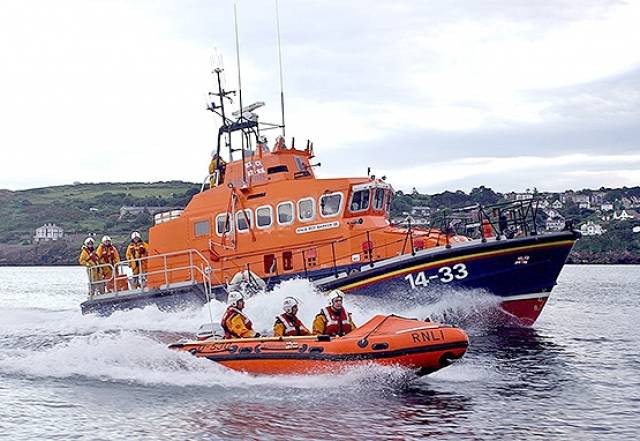People across Ireland are being encouraged to help raise vital funds for the RNLI as part of the charity’s national annual fundraising event, Mayday.
The RNLI’s Mayday campaign runs through to the May Day bank holiday next Monday 2 May, with street collections and fundraising events taking place across the country.
RNLI lifeboat crew members are volunteers and remain on call 24 hours a day, and when the pager goes off they’ll drop everything to help somebody in need - often sacrificing their work and personal commitments.
David Howard, volunteer crew member at Howth lifeboat station, knows only too well the sacrifices that RNLI volunteers need to be willing to make, in order to drop everything and save lives at sea.
After months of secret preparation, David was all set to finally pop the question on Christmas Eve night. He had the specially designed ring in his hand and he was just waiting for his girlfriend to come home so he could get down on one knee and ask her to marry him – but then his pager beeped.
Abandoning his plans, David dashed to the lifeboat station. One minute he was plucking up the courage to propose, the next minute he was in the lifeboat out at sea saving a fisherman with head injuries.
On Christmas morning, David was finally able to get down on one knee and ask his girlfriend to marry him. And, of course, she said yes!
David said: ‘When the pager beeped, I didn’t think twice before dashing straight to the lifeboat station. Like all of the RNLI’s volunteer crew members, I know that when the pager beeps, every second counts, so you have to stop whatever you’re doing to go and save lives at sea.
‘The way I was going to propose was carefully planned to the finest detail, but all of those plans went out of the window when the pager went off. Luckily, I was able to pop the question the next day, and I was over the moon when she said yes.’
Every day is Mayday for the RNLI’s lifeboat crews, who are specially-trained volunteers, on-call 24/7 to save lives at sea. Whatever the weather, day or night, they are ready to drop everything and launch the lifeboats to rescue anyone in danger at sea. But, as a charity, the lifesaving service they provide is only possible thanks to the generous support of the public.
Many of the Mayday fundraising events have a yellow welly theme, in a nod to the essential kit that the RNLI’s lifeboat crew members wear on their feet when they go out to sea to save lives.
The charity is encouraging people to show their support by using the hashtag #MaydayEveryday on social media, buying and wearing a Mayday yellow welly pin badge, hosting or supporting a fundraising event or donating online.
Money raised through Mayday fundraising events will support the RNLI’s lifesaving work – it could be used to fund crew training, buy new crew kit, or contribute towards the running costs of a lifeboat station.
Visit RNLI.org/Mayday to donate, to order a pin badge or to see what other ways you can support the RNLI’s Mayday campaign.
The RNLI operates 45 lifeboat stations around Ireland. Last year, RNLI lifeboat crews in Ireland launched 1,098 times bringing 1,244 people to safety.































































